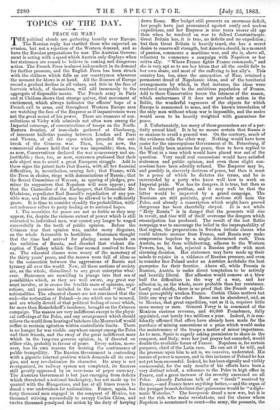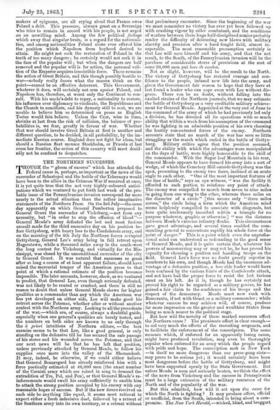TOPICS OF THE DAY.
PEACE OR WAR? THE political clouds are gathering heavily over Europe. The Russian reply has startled those who expected an evasion, but not a rejection of the Western demand, and so have the Russian preparations for war. The Austrian Govern- ment is acting with a speed which Austria only displays when her statesmen are roused to believe in coming and dangerous action. The French Press is almost independent in its demand for further pressure, and the English Press has been struck with the stillness which falls on our countrymen whenever the moment for blows is at hand. All the Bourses of Europe record a gradual decline in all values, and this in the face of harvests which, of themselves, will add immensely to the aggregate of disposable means. The French army in Paris and at Chalons shows that strange quiver, that movement of excitement, which always indicates the officers' hope of a French call to arms, and throughout Western Europe men are watching the face of the Emperor as if impassiveness were not the great secret of his power. There are rumours of con- sultations at Vichy with admirals not often seen among the Imperial entourage, of concentrations of troops on the North- Eastern frontier, of iron-clads gathered at Cherbourg, of incessant bulletins passing between London and Paris and Vienna, of all the signs which preceded the out- break of the Crimean war. Then, too, as now, the commercial classes held that war was impossible; then, too, as now, Conservatives declared the war unnecessary and un- justifiable; then, too, as now, statesmen professed that their sole object was to avoid a great European struggle. Add to these signs the patent facts that Russia, with all her financial difficulties, is, nevertheless, arming fast; that France, with the Press in chains, rings with denunciations of Russia ; that the Secret Committee of Warsaw, so sparing of pledges, pro- mises its supporters that Napoleon will soon appear; and that the Chancellor of the Exchequer, that Chancellor Mr. Gladstone, repudiates Earl Russell's repudiation of any pos- sible war, and the situation may be allowed to be sufficiently grave. It is time to consider steadily the probabilities, with- out reference either to party feeling or to national hopes.
1. The securities for peace are not so feeble as they may appear, for, despite the ruinous extent of power which is still entrusted to individual men, war cannot any longer be waged successfully in the teeth of public opinion. Before the Crimean war that opinion was, amidst many disguises, on the whole favourable to hostilities. Statesmen thought that the time had arrived for placing some bounds on the ambition of Russia, and dreaded that violent dis- ruption of Turkey which the Czar seemed resolved to force on. The educated classes were weary of the monotony of the thirty years' peace, and the masses were full of ideas as to the connection between the aggressions of Russia and tyranny all over the world. Now, all these sections of society are, on the whole, disinclined to any great enterprise what- ever. Statesmen are unwilling to plunge into that sea of possibilities which, as they are well aware, any great war must involve, or to arouse the terrible mass of opinions, aspi- rations, and passions included in the so-called " idea " of nationalities. The educated classes are not convinced that the end—the restoration of Poland—is one which can be secured, and are wholly devoid of that political feeling of ennui which, far more than Menschikoff's insolence, brought on the Crimean -campaign. The masses are very indifferent except to the physi- cal sufferings of the Poles, and any arrangement which should relieve the world from hearingof butchers likeMouravieff would suffice to restrain agitation within controllable limits. There is no hunger for war visible anywhere except among the Poles and their friends, and the sway of the great indifferent mass which in the long-ran governs opinion, is, if directed on either side, probably in favour of peace. Every nation, more- over, has its own reasons for desiring the continuance of public tranquillity. The Russian Government is contending with a gigantic internal problem which demands all its ener- gies, and may revolutionize its character. Its army is not re-organized, its railway system not completed, its finances still greatly oppressed by an over-issue of paper currency. The Austrian Government is but just emerging from deficits which threatened a national bankruptcy, has not made up its quarrel with the Hungarians, and has at all times reason to dread a war undertaken for nationalities. France, again, has forty thousand men engaged in the conquest of Mexico, ten thousand striving successfully to occupy Cochin China, and twelve thousand paralyzed for action by the duty of keeping down Rome. Her budget still presents an enormous deficit, her people have just pronounced against costly and useless expeditions, and her Emperor is nine years nearer old age than when he resolved on war to defend Constantinople. Great Britain has, it is true, no deficits and no expedition ; but then Great Britain is heavily taxed, she has a secret desire to reserve all strength, lest America should, inn moment of passion, commence a maritime war, and she is, above all, reluctant to commence a campaign with Napoleon as her active ally. "Where France fights France commands," and she is very apt so to use her baton that all the credit falls to her own share, and most of the suffering to her ally's. This country has, too, since the annexation of Nice, retained a permanent dread of Napoleonic ideas, and of the territorial arrangements by which, in that instance, the ideas were rendered acceptable to the ambitious population of France. Add to these Conservative forces the lateness of the season, which embarrasses if it does not preclude action in the Baltic, the wonderful vagueness of the objects for which Europe is summoned to arms, and the known irresolution of the only man -without whom war is impossible, and the scales would seem to be heavily weighted with guarantees for peace.
2. Unfortunately, too many of these guarantees are of a par- tially unreal kind. It is by no means certain that Russia is so anxious to avoid a general war. On the contrary, much of the evidence tells the other way. Nothing would have been easier for the unscrupulous Government of St. Petersburg, if it had really been anxious for peace, than to have replied to the West in a tone which would have placed war out of the question. Very small real concessions would have satisfied statesmen and public opinion, and even those slight con- cessions have been adroitly refused. The Emperor may be, and possibly is, sincerely desirous of peace, but then it must be a peace of which he dictates the terms, and he is surrounded by a party who know well how to work on Imperial pride. War has its dangers, it is true, but then so has the internal position, and it may well be that the latter would be improved by a grand campaign. The Russians are still patriotic, great sections still hate the Poles, and already a conscription which might have proved dangerous has been cheerfully obeyed. It is not while "Holy Russia" is in danger that the peasants will rise in revolt, and time will of itself overcome the dangers which emancipation has produced. The result of the last Baltic campaign was to encourage the belief in the impregnability of that region, the preparations in Sweden irritate classes who could tolerate menace from France, and Russia may make compromise hopeless by a single determined rush. Then Austria, so far from withdrawing, adheres to the Western Powers, has, in fact, rejected a Russian proffer with most alarming decision. Her statesmen may have made up their minds to rejoice in a riddance of Russian pressure, and even to consider free Poland under an Austrian Archduke the best guarantee for their frontier. Above all, while Prussia is Russian, Austria is under direct temptation to be actively and heartily liberal. Her adhesion would remove at a blow half the difficulties in the way of a war, and her adhesion is, on the whole, more probable than her resistance. Lastly and chiefly, there is no proof that the French expedi- tions perceptibly weaken France. Cochin China matters but little one way or the other. Rome can be abandoned, and, as to Mexico, that great expedition, vast as it is, requires little more money or men. General Forey is in command of the Mexican customs revenue, and 40,000 Frenchmen, fully appointed, cost barely two millions a year. Indeed, it is con- fidently affirmed that offers have already been made for the purchase of mining concessions at a price which would make the maintenance of the troops a matter of minor importance. As to men, Spain is eagerly asking permission to share in the conquest, and Italy, were her just prayer but conceded, would double the available forces of France. Napoleon is, for certain purposes, chief of the Latin race. He can act if he will, and the pressure upon him to act is, we conceive, underrated. His tenure of power is success, and in this instance of Poland he has not yet been successful. Indeed, he has been signally and visibly unsuccessful, for the only results of his efforts have been a very distinct rebuff, a reference to the Poles in high office in France, and a great increase of the severity exercised OD all Poles. Already Parisians talk of an " insult " received by France,—and France bears anything better,—and the organ of the younger branch declares that quiescence would be "a diplo- matic Waterloo." The bourgeoisie dread a new war, but it is not the rich who make revolutions, and the classes whom Napoleon is accustomed to court—the army, the peasants, the makers of epigrams, are all crying aloud that France owes Poland a -debt. This pressure, always great on a Sovereign who tries to remain in accord with his people, is not urged on an unwilling mind. Among the few political feelings which sway that singular brain, is a regard for the nationali- ties, and among nationalities Poland alone ever offered him the position which Napoleon from boyhood desired to attain. He might not seek the restoration of Poland in the teeth of too many dangers ; he certainly would not seek it in the face of the popular will ; but when the dangers are half ; removed and the popular will is for action, the personal voli- tion of the Emperor acquires irresistible force. There remains the action of Great Britain, and this though possibly hostile to war—nobody really knows what the masses think on the point—cannot be an effective deterrent. This Government, whatever it does, will certainly not arm against Poland, and Napoleon has, therefore, at worst only the Continent to con- sult. With his uncle's debt to repay, a nationality to restore, his influence over diplomacy to vindicate, the Republicans and the Church to conciliate, and his dynasty still to seat, we are unable to believe him so determined on peace as English Tories would fain believe. Unless the Czar, wise in time, shrinks at last frona the risk of collision, the balance of pro- babilities is, we fear, greatly in favour of war. Whether that war should involve Great Britain at first is another and different question, to be decided, in all probability, by the im- mediate Russian course. England does not fight for ideas, but should a Russian fleet menace Stockholm, or Prussia at last cross her frontier, the action of this country will most decid- edly not be confined to despatches.































 Previous page
Previous page